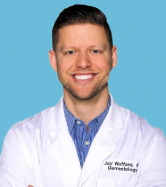There are numerous common skincare myths that you’ve likely heard repeated by your parents, online, and even on your favorite TV shows. It can be tempting to adhere to these skincare myths, but we have consulted with board-certified dermatologists in this blog to debunk some of these common skincare myths once and for all.
Myth 1 – Sensitive Skin Types Should Only Use All-Natural & Organic Products
Dr. Jay Wofford is a board-certified dermatologist who works for U.S. Dermatology Partners in Plano and Dallas, Texas. Dr. Wofford’s main interest in dermatology is in inflammatory skin conditions, including treating clients with sensitive skin types and atopic dermatitis (eczema). In Dr. Wofford’s expert opinion, “The terms ‘all-natural’ and ‘organic’ generally mean the product contains plant-based and/or herbal ingredients. These ingredients are very common causes of irritant and allergic reactions for people with sensitive skin and inflammatory skin conditions. Patients with sensitive skin types should avoid these products, and instead, they should use skincare products specifically designed for people with sensitive skin.”
Myth 2 – You Should Remove Bandages to Let Wounds Breathe
As part of his work with patients who struggle with inflammatory skin conditions, Dr. Wofford, sees a lot of inflamed, irritated, and infected wounds. He offers the following advice when it comes to every mother’s best skincare advice to let your wound breathe, “Traumatic injuries and surgical wounds heal best when kept covered with a moist barrier layer at all times until healed. Allowing a wound to ‘breathe’ will cause it to dry out, allowing a scab to form, which delays healing.”
Myth 3 – Hydrogen Peroxide is the Best Product for Cleaning Wounds
Dr. Wofford addressed this additional myth about wound healing. According to Dr. Wofford, “Hydrogen peroxide can be used to clean and sterilize a wound immediately after it occurs. However, within less than an hour after a wound occurs, the skin cells around the wound begin the healing process. At any point after this, hydrogen peroxide actually interferes with the healing of the wound and should not be used. Washing with regular soap and water is more than adequate to clean wounds and should be done gently.”
Myth 4 – Wearing Sunscreen Isn’t Necessary when it’s Cloudy Outside
The idea that you don’t need to wear sunscreen when it’s cold or cloudy outside is one of the most common skincare myths we hear from patients. According to Dr. Wofford, “You can still get a sunburn on a cloudy day and should wear sunscreen if you’re planning to be outdoors for extended periods of time regardless of cloud cover. In fact, people can often be more likely to get a sunburn on a cloudy day because the reduced heat sensation on the skin surface (due to the clouds) deceives people into thinking they are getting less sun exposure, so they may stay out longer or be less likely to seek shade.” You should use a broad-spectrum sunscreen with a sun protection factor (SPF) of 30 or higher every day on all parts of the body that will receive sun exposure every day.
Myth 5 – Reduce Bathing 1 to 2 Times Per Week for Dry Skin or Eczema
Dr. Howard Luber is a skilled dermatologist working at the U.S. Dermatology Partners affiliates, Southwest Skin Specialists in Phoenix and Scottsdale, Arizona. Dr. Luber practices general dermatology, but he has a special interest in skin cancer and the skin-related symptoms of internal medical diseases. One of the common skincare myths that Dr. Luber is passionate about debunking is the idea that fewer showers and baths are the best way to keep dry skin moisturized. According to Dr. Luber, “Contrary to this misinformation, dry skin needs water. Just like a dry lawn or garden needs water, so does dry skin! But the key to successful rehydration of dry skin or eczema is trapping moisture on skin with an emollient. It is best to soak the skin in a bath for 10-20 minutes, once or twice a day (not a week), partially towel off excess water, then, apply a bath oil or emollient cream to damp skin before the skin has fully dried. This is also a good time to apply any medicated cream or ointment to eczematous (eczema-prone) dry skin, while it is still damp. While they don’t need to reduce the number of showers, those with dry or eczema-prone skin should use a gentle cleanser (like Cetaphil, Aveeno) and avoid bubble baths and harsh soaps or shampoos.”
Myth 6 – A Base Tan Is Adequate Sun Protection
Dr. Sam Awan is a trusted dermatologist treating patients at U.S. Dermatology Partners in McKinney, Texas. Dr. Awan loves the variety in dermatology practice and being able to see a range of patients, but he has a particular interest in the treatment and prevention of skin cancer. He is dedicated to debunking common skincare myths surrounding sun damage and skin cancer, including the idea that base tans are adequate sun protection. According to Dr. Awan, “Any amount of tanning is considered harmful. While it is true tanning is a defense mechanism your body uses to decrease DNA damage, a base tan gives the equivalent of less than SPF 5. A much higher SPF is needed to provide adequate protection from sun damage.”
Myth 7 – Only Sunburns Cause Skin Cancer
In addition to debunking the idea that a base tan will protect against sunburns, Dr. Awan also pointed out that many skin cancers have been linked to chronic, lower-dose UV exposure over many years. Dr. Awan said, “Similar to the last point, even tanning without burning increases DNA damage and significantly increases the risk of skin cancer. Too many people start out their summers getting a base tan – if this is done regularly, this can dramatically increase skin cancer risk over time.”
Myth 8 – Neosporin Is the Best Skincare Product for Cuts
Dr. Jacqueline Watchmaker is another trusted dermatologist working at Southwest Skin Specialists in Phoenix and Scottsdale, Arizona. Dr. Watchmaker is well-known professionally for her expertise in a variety of dermatologic specializations, including laser treatments and cosmetic dermatology. The idea that Neosporin is necessary to treat wounds and prevent infection is one of the myths she often debunks, letting her patients know, “The vast majority of minor skin wounds do not need topical antibiotics. Instead, just use Vaseline or Aquaphor and a Band-Aid! Some of the ingredients in topical antibiotic ointments have a high rate of causing allergic contact dermatitis, so they can often do more harm than good.”
Myth 9 – Toothpaste Clears Clogged Pores & Improves Acne-Prone Skin Health
Another common skincare myth that can often cause more harm than good is the idea that putting toothpaste on blemishes helps to clear up clogged pores and breakouts for those with acne-prone skin. According to Dr. Watchmaker, “This is a common myth spread around by teens. I think just about every teenager with acne has tried this DIY pimple treatment. Many acne medications and facial washes have camphor, mint, and other natural ingredients that cause a stinging sensation similar to the sensation of putting toothpaste on pimples. While it may feel like these treatments, toothpaste doesn’t actually help to clear up blemishes or clean out clogged pores. Instead, applying toothpaste to pimples can lead to more irritation and inflammation, further clog pores, and lead to increased redness and risk for scarring.”
Myth 10 – Retinols in the Skincare Routine Make Skin Thinner
Retinoids, retinols, and tretinoin are all vitamin A-derived dermatologic products used to improve skin tone and texture, diminish premature signs of skin aging, and improve acneic skin. Many people avoid using these skincare products (often simply referred to as retinols) because they’ve heard retinols cause skin thinning. According to Dr. Watchmaker, this isn’t the case. She says, “Initially, retinols and tretinoin can cause superficial flaking of the skin because these products exfoliate the skin through faster skin cell turnover. With continued use, usually the flaking minimizes, and the dermis actually becomes thicker.”
Myth 11 – Glycolic Acids Are Skincare Products that Double as Antiperspirants
Glycolic acid is an ingredient in many skincare products that can exfoliate the skin and brighten the complexion. However, glycolic acid in the underarms does not take the place of an antiperspirant and does not stop sweating. Glycolic acid may help minimize body odor but it can also potentially lead to skin irritation so Dr. Watchmaker recommends sticking to more traditional deodorants and antiperspirants.
Myth 12 – SPF 30 Sunscreen Blocks Out Necessary Vitamin D
One of the myths Dr. Watchmaker is most concerned about is the idea that wearing SPF sunscreen doesn’t allow people to absorb necessary levels of vitamin D from the sun. Sunscreen prevents sunburn and potential skin cancers by blocking ultraviolet rays and studies show that people who use sunscreen daily can maintain healthy vitamin D levels. Healthy ways to ensure adequate Vitamin D levels are by eating a healthy balanced diet and taking oral supplements if necessary.
Want to Continue Separating Dermatology Fact from Fiction?
If you’d like to get more great skincare advice and continue learning the difference between skincare facts and fiction, the team at U.S. Dermatology Partners would love to hear from you. We make working with our dermatology offices quick and easy. Just take a few moments to complete our scheduling request form online. Once we receive your request, a local dermatology team will be in touch to finalize your visit.
Find a location near me
or





